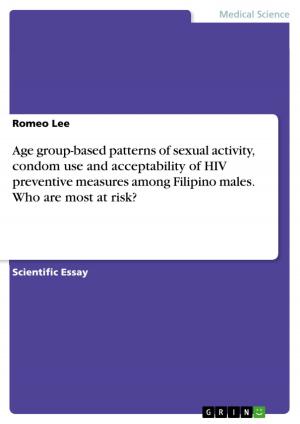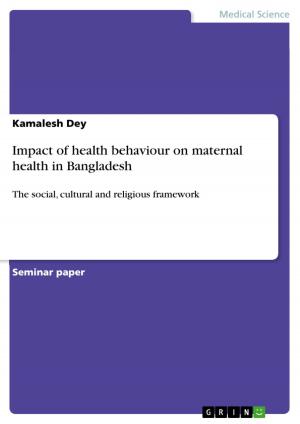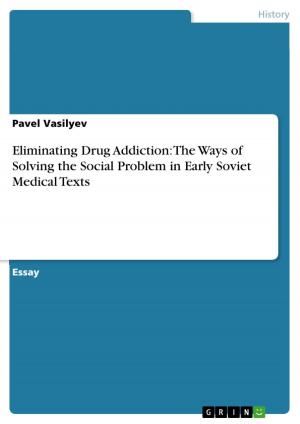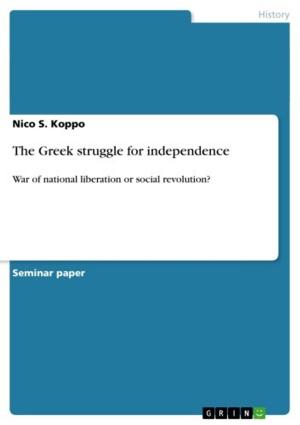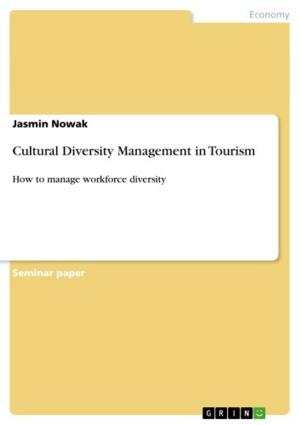| Author: | Felix Hettlage | ISBN: | 9783638172608 |
| Publisher: | GRIN Publishing | Publication: | February 19, 2003 |
| Imprint: | GRIN Publishing | Language: | English |
| Author: | Felix Hettlage |
| ISBN: | 9783638172608 |
| Publisher: | GRIN Publishing |
| Publication: | February 19, 2003 |
| Imprint: | GRIN Publishing |
| Language: | English |
Seminar paper from the year 2002 in the subject Business economics - Personnel and Organisation, grade: 2,0 (B), Maastricht University (Faculty of Economics and Business Administration), 12 entries in the bibliography, language: English, abstract: It often seems as if the world is shrinking. Satellite, internet and cable technologies make it easier to communicate with friends, colleagues, and strangers in other countries on a realtime basis. Increasingly open borders give access to more countries, and citizens of previously 'closed' countries in turn to have access to the rest of the world. Due to these innovations it became possible to learn more about cultural differences as well as similarities. This new situation is especially valuable for companies that operate on an international or global scale. These companies can penetrate new markets to enhance profits but on the other hand these companies face also a complex and rapidly changing global environment. Companies have to deal with global and local competitors plus with multiple cultural settings that might be unfamiliar and difficult to comprehend. To survive in this global environment, companies have to be able to understand and to deal with this complexity. According to Antal (2000) a company has three keys to manage this challenge: a powerful strategic vision, a responsive structure, and internationally skilled people. The author further argues that people create and implement powerful strategic visions and responsive structure and hence the ability to develop employees and to utilize what employees have learned is the core competence organisations require to become and to remain competitive today. This argument suggests that organisational learning and International Strategic Human Resource Management are interconnected. The knowledge and learning of employees build the foundation for organisational knowledge, and thus organisations are only able to learn when the individual knowledge is transferred to the organisation. Recognizing the importance of internationally skilled people for the organisation is especially important for international operating companies because learning about cultural differences and similarities may determine future success in unfamiliar markets.[...] The implication than for international organisation is that it should absorb as much knowledge from returning expatriates as possible in order to increase competitive competence. But since not all acquired knowledge of expatriates is useful and transformable into organisational knowledge the following core question of this paper arises: How valuable are expatriates to organisational learning? [...]
Seminar paper from the year 2002 in the subject Business economics - Personnel and Organisation, grade: 2,0 (B), Maastricht University (Faculty of Economics and Business Administration), 12 entries in the bibliography, language: English, abstract: It often seems as if the world is shrinking. Satellite, internet and cable technologies make it easier to communicate with friends, colleagues, and strangers in other countries on a realtime basis. Increasingly open borders give access to more countries, and citizens of previously 'closed' countries in turn to have access to the rest of the world. Due to these innovations it became possible to learn more about cultural differences as well as similarities. This new situation is especially valuable for companies that operate on an international or global scale. These companies can penetrate new markets to enhance profits but on the other hand these companies face also a complex and rapidly changing global environment. Companies have to deal with global and local competitors plus with multiple cultural settings that might be unfamiliar and difficult to comprehend. To survive in this global environment, companies have to be able to understand and to deal with this complexity. According to Antal (2000) a company has three keys to manage this challenge: a powerful strategic vision, a responsive structure, and internationally skilled people. The author further argues that people create and implement powerful strategic visions and responsive structure and hence the ability to develop employees and to utilize what employees have learned is the core competence organisations require to become and to remain competitive today. This argument suggests that organisational learning and International Strategic Human Resource Management are interconnected. The knowledge and learning of employees build the foundation for organisational knowledge, and thus organisations are only able to learn when the individual knowledge is transferred to the organisation. Recognizing the importance of internationally skilled people for the organisation is especially important for international operating companies because learning about cultural differences and similarities may determine future success in unfamiliar markets.[...] The implication than for international organisation is that it should absorb as much knowledge from returning expatriates as possible in order to increase competitive competence. But since not all acquired knowledge of expatriates is useful and transformable into organisational knowledge the following core question of this paper arises: How valuable are expatriates to organisational learning? [...]


